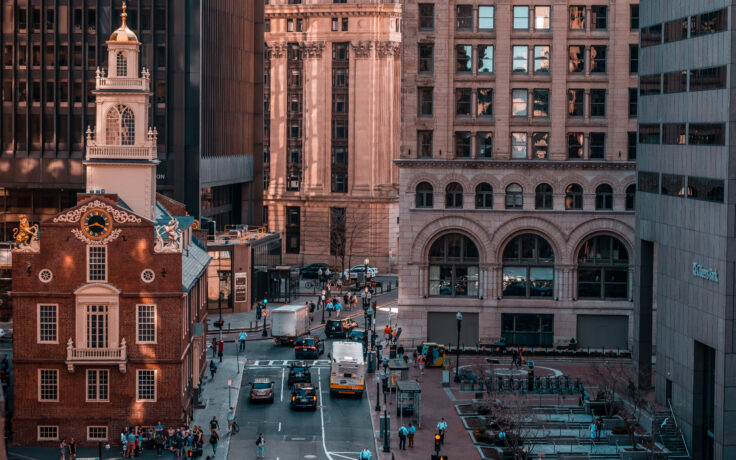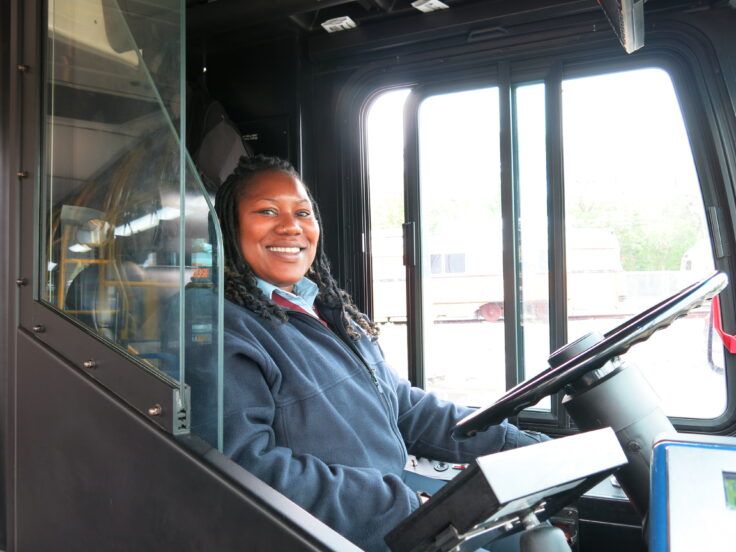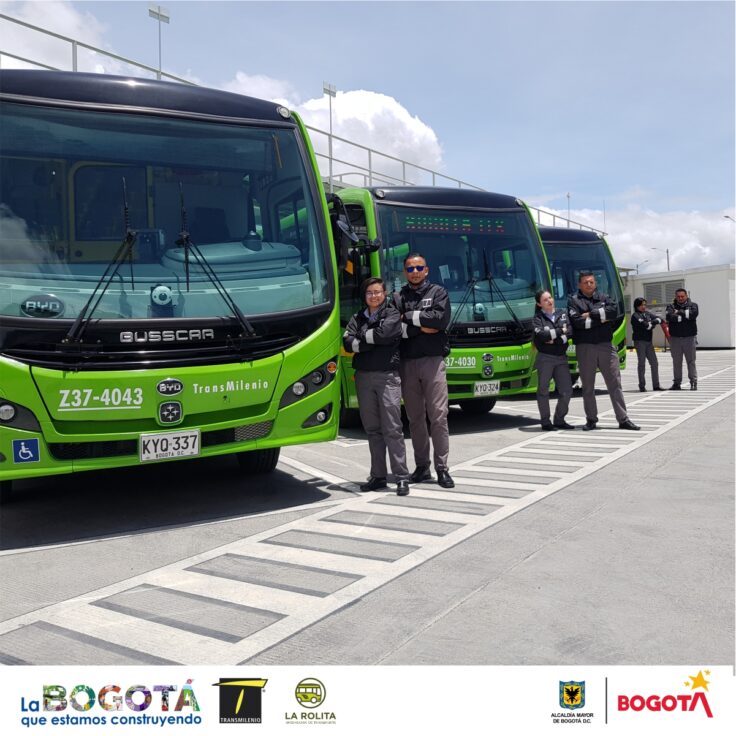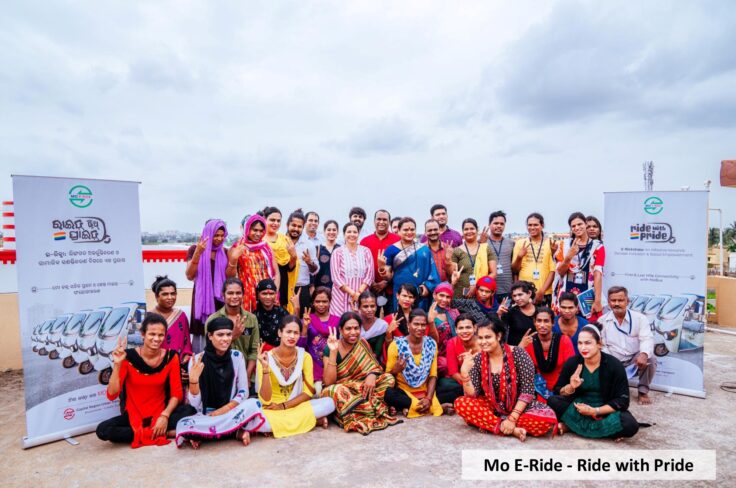May 19, 2023
To Tackle Staffing Shortages, Boston’s Bus System Can Learn From These Global Cities
Public transit systems around the world are facing a crisis of reduced ridership, declining revenue, health and safety concerns, and urgent staffing shortages.
Read more about challenges and potential solutions for improving Greater Boston’s bus system.
In the US in particular, the TransitCenter reports that more than nine in ten public transit agencies are having difficulty hiring new employees, with bus operations positions the most difficult to fill, and nearly two-thirds of agencies have had employee retention issues. Even before the pandemic, these challenges were persistent, with underfunded and understaffed transit systems commonplace across the country — estimates put the backlog in funding at nearly $176 billion USD — which ultimately comes at the expense of the many communities that rely on public transit to live.
To address these systemic challenges, US cities need practical, creative solutions alongside more political will and public- and private-sector investment into transit. In the Greater Boston area in particular, where ITDP’s US Program has been working to advance Bus Rapid Transit (BRT) and sustainable transport in recent years, workforce challenges are especially evident and have far-reaching implications. However, drawing on ITDP’s broad knowledge of transport solutions worldwide, we know that there exist real-world models that can empower Greater Boston to build more resilient and reliable transportation.

The MBTA should focus on training and hiring more women, gender non-conforming individuals, low-income workers, and people of color to address its the workforce challenges.
The Challenges Facing Boston
Despite concrete plans to improve the reliability, frequency, and quality of bus service, Greater Boston’s regional transit agency (MBTA) continues to be impeded by a major bus operator shortage. In 2021, the agency implemented numerous service cuts due to insufficient drivers to meet the existing schedules and, since then, has continued to reduce service for the same reason. While these challenges are not unique to Boston, the region is lagging behind peer cities and agencies in implementing effective solutions. In fact, despite increased attention and energy focused on addressing the issue, these problems are only getting worse.
According to ITDP and LivableStreets Alliance’s Keeping Pace Bus Report released earlier this year, the MBTA lacks 300 drivers to meet the level of service that existed prior to these cuts, and still lacks 440 drivers to deliver the 25% service increase proposed by a Bus Network Redesign approved in December 2022. One of the report’s primary recommendations for addressing this crisis is to explore new ways to attract and retain more diverse employees, such as women, gender non-conforming individuals, low-income workers, and people of color. This includes specific suggestions for implementing an employee childcare program for frontline staff and incorporating gender-specific amenities in new designs for facilities or retrofitted spaces.
Approximately 50% of MBTA transit operators are women/femme but the agency’s facilities were constructed at a time when there were very few women bus drivers. This has resulted in a lack of amenities — such as private and clean spaces to pump breast milk — which could make the job more manageable and comfortable. Additionally, a recent study demonstrated a gender-based wage gap that stems from the need for women in the workforce to provide childcare duties instead of having the flexibility to take overtime shifts like their male counterparts. As the region works to prioritize reliable and frequent bus service for residents, the MBTA, legislators, and advocates should look to other cities for examples of innovative strategies for recruiting and retaining a larger, more diverse workforce.

Learning from Bogotá, Colombia
The city of Bogotá was awarded the 2022 Sustainable Transport Award (STA) for its comprehensive strategies to promote road safety, cycling and pedestrian infrastructure, and electric bus service. Read more about the policies and interventions that won the city the STA in this case study. One critical component of Bogotá’s transport innovations is its push to electrify 100% of its TransMilenio BRT fleets by 2030, which would become the largest fleet of its kind in the region. As the city advances sustainable transit, it also launched a pioneering initiative known as La Rolita, a publicly-owned bus company that provides the city with more options in negotiations and when issues occur with private operators. La Rolita is part of the city’s Integrated Public Transport System (SITP), using the same fare media, which helps people access TransMilenio better and improve service to peripheral areas. Thus far, La Rolita operates 195 electric buses on 11 routes benefitting more than 35,000 users from over 2o neighborhoods of the Ciudad Bolívar area.
La Rolita is also notable for its efforts to expand and promote gender equity in its workforce through the recruitment of mostly women as operators. Led by the Mobility Secretariat, La Rolita’s recruitment initiatives aim to educate, train, and help women recategorize their driving licenses to be eligible to become drivers of buses for the company. La Rolita employees are paid well over the country’s minimum wage, offered a pension, and are able to use a public daycare services until a dedicated childcare center for employees is developed. The program has already included over 450 women and encourages many more to take up leadership roles in the sector. These opportunities to enter the formal economy are rare for many working class women in the city, and ensures access to economic and skills development for a new generation of operators.

Learning from Bhubaneswar, India
An honorable mention city for the 2023 STA, Bhubaneswar, India has been working to modernize and expand its regional bus service (known as Mo Bus) alongside an electric three-wheeler service (known as Mo E-Ride) for first and last mile connectivity. These services place a crucial focus on passenger comfort and safety, while empowering an under-tapped workforce of women and gender non-conforming people from the city’s low-income communities.
In a region with a population of over a million, Bhubaneswar’s Capital Region Urban Transport (CRUT) agency has doubled down on efforts to improve service, particularly in reaching peripheral neighborhoods and communities. Part of this endeavor has been to introduce modern electric vehicles into service that can make travel safer, more comfortable, and more affordable. With Mo E-Ride, CRUT introduced the three-wheelers to address connectivity issues and to ensure commuters have options to safely access geographies not served by the standard bus routes.
To operate the Mo E-Ride vehicles, CRUT is actively recruiting, training, and hiring women and transgender people from local communities. The results of these targeted efforts have been quite promising — a 2020 rider survey conducted by the agency found an increase in feelings of safety amongst women using transit. Commuter confidence in the region’s public transit has continued to grow with CRUT’s focus on inclusion and sustainability — in fact, nearly 57% of riders reported shifting from other modes of transport to the bus system in the past year, according to city officials.

While these two examples are certainly not all encompassing, they demonstrate that solutions do exist and are possible for all types of cities. With the right amount of political willpower, resource allocation, and collaboration, our public transport can make much-needed progress. In the cases of Bogotá and Bhubaneswar — regions with very different cultural and economic contexts — both cities earned global recognition for the innovation and investment they put into empowering women and other communities while also tackling staffing and service shortages. The MBTA and Boston’s policymakers can learn by taking a more intersectional approach to addressing their own challenges of connectivity, equity, and employment. As we emerge from the pandemic, all cities need to find creative ways to meet the evolving needs and demands of their bus systems, transit networks, and — most importantly — their people.
Download the Keeping Pace Bus Report for more details on challenges and potential solutions for Greater Boston’s bus system.
Learn more about Bogotá and Bhubaneswar’s mobility strategies in these Mobilize and STA Webinar Series.
